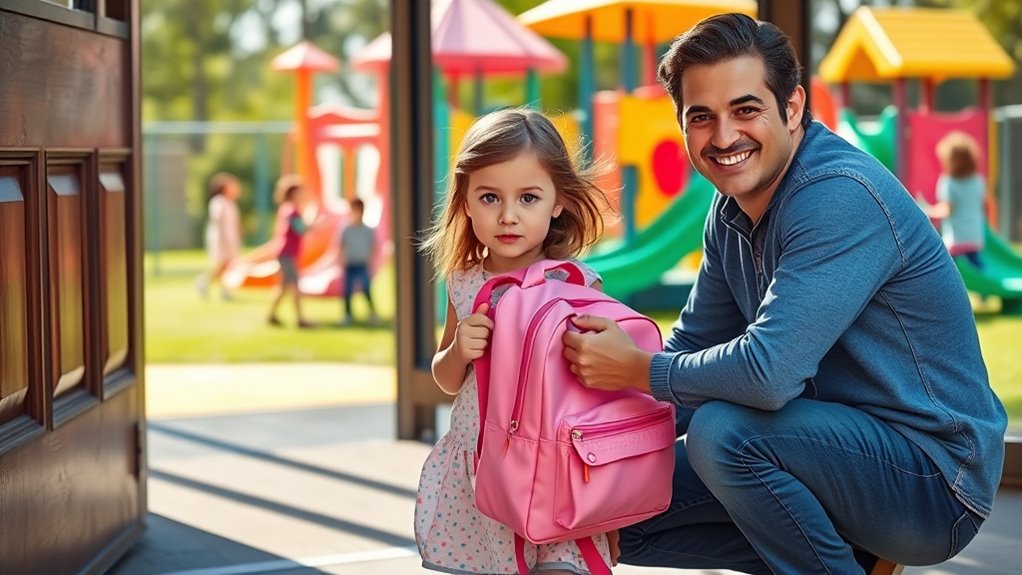To help your child handle first-day jitters, validate their feelings and create a predictable routine that eases anxiety. Visit the school together beforehand, talk about what to expect, and pack a comfort item like a photo or stuffed animal. During drop-off, stay calm, keep goodbyes brief, and offer reassuring words. Encourage positive self-talk and celebrate small successes. Supporting your child’s emotional needs now will help your child feel more confident and prepared—more tips await if you keep exploring.
Key Takeaways
- Establish a comforting, predictable routine and tour the school to reduce uncertainty and build familiarity.
- Validate your child’s feelings, encourage positive self-talk, and celebrate small successes to boost confidence.
- Use visual aids and comfort items to explain daily activities and provide reassurance during separation.
- Model calmness and keep goodbyes brief, offering reassurance to foster a sense of security.
- Discuss feelings openly, address worries, and celebrate milestones to support emotional well-being during the transition.
Recognize and Validate Your Child’s Feelings
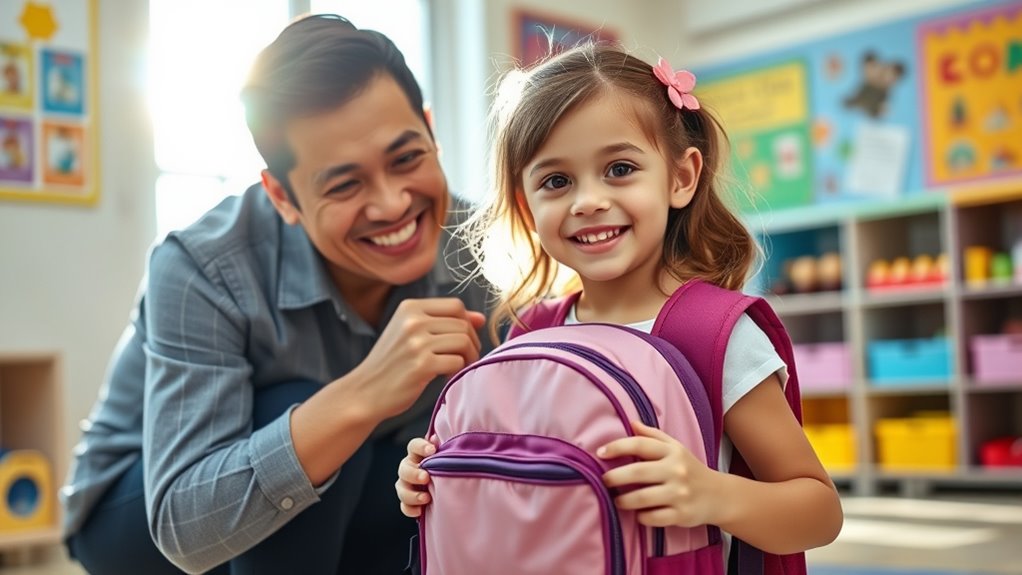
When your child expresses worries or fears about starting school, it’s important to recognize and validate their feelings. By doing so, you build trust and show that their emotions are valid. Instead of dismissing their concerns, listen carefully and acknowledge their fears with empathy. Say things like, “I understand you’re feeling nervous,” or “It’s okay to feel scared; many kids do.” This emotional validation reassures your child that their feelings are normal and respected. When you respond thoughtfully, you help them feel safe and supported. Trust building begins when your child knows they can share their worries without judgment. Validating their emotions now sets a strong foundation for open communication and confidence as they face new experiences. Recognizing and understanding children’s emotional responses can further reinforce their ability to cope with new situations.
Establish a Consistent Routine Before School Starts
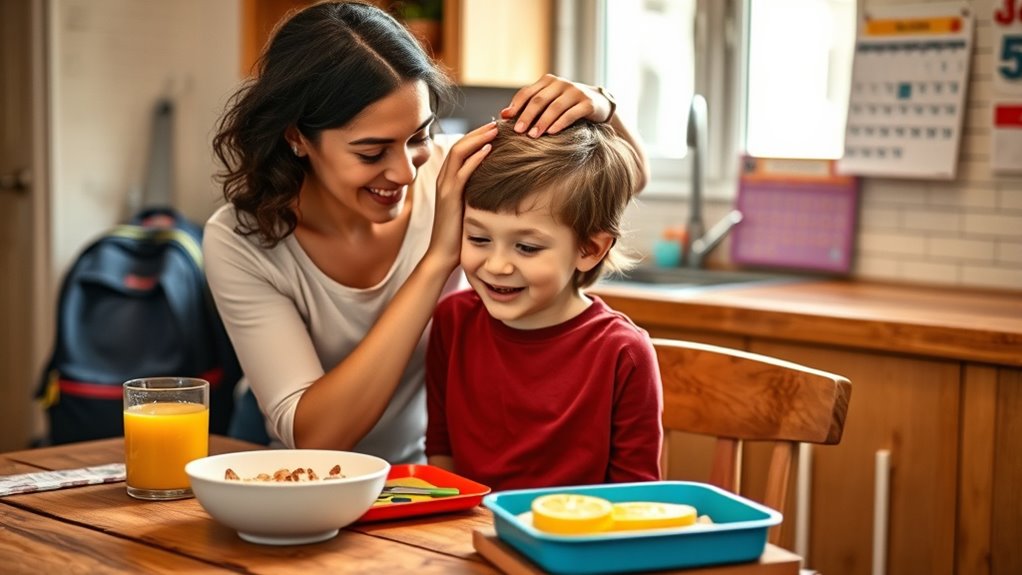
Creating a predictable routine before school helps ease your child’s first-day jitters by providing a sense of stability. Establish consistent bedtime routines so your child knows what to expect each night, helping them feel more secure and rested. Make certain they get enough sleep by sticking to a set bedtime, making mornings smoother. Prepare healthy snacks ahead of time, so your child has nutritious options for energy and focus during the day. Consistent routines reduce uncertainty, making transitions easier and less stressful. When your child knows what comes next, they gain confidence and feel more in control. Keep mornings simple by setting regular wake-up times and organizing essentials the night before. This stability builds a foundation of trust and reassurance, easing anxiety about the first day of school. Incorporating a calming skincare routine can also help children feel more relaxed and comfortable as they start their day.
Visit the School Together Before the First Day

Visiting the school together before the first day can considerably reduce your child’s anxiety by familiarizing them with their new environment. Take a school tour to show them key areas like the classroom, cafeteria, and playground. Walking through these spaces helps your child picture themselves there, making the environment feel less overwhelming. During the visit, consider arranging a peer introduction if possible. Meeting a future classmate or two can create a sense of familiarity and friendship, easing first-day nerves. Keep the visit brief but informative, highlighting positive aspects of the school. By doing this, you help your child build confidence and feel more in control. Incorporating essential oils for anxiety relief, such as lavender oil, during or after the visit can further promote relaxation and ease any lingering nervousness. A pre-visit makes the transition smoother and sets a supportive tone for their first day.
Talk About What to Expect on the First Day
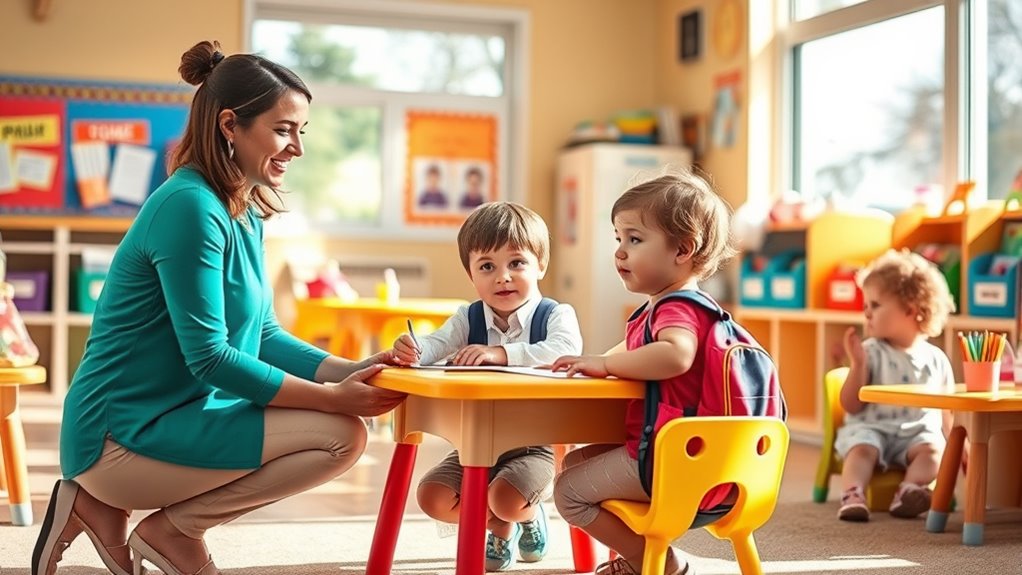
Since the first day can feel overwhelming, talking about what to expect helps your child feel prepared and less anxious. Explain the daily schedule, including recess, lunch, and class activities, so they know what’s coming. Address separation anxiety by reassuring them you’ll be there to pick them up and that new friends will be made. Discuss peer interactions, like sharing and playing, to prepare them for socializing. Use this table to visualize ideas:
| What to Expect | Tips to Prepare |
|---|---|
| Separation anxiety | Reassure they’ll be safe and loved |
| Peer interactions | Encourage kindness and sharing |
| Daily routine | Review the schedule together |
| Recess and breaks | Talk about fun activities |
Additionally, explaining how automation in business is transforming school operations, like scheduling and resource management, can help your child understand the broader world of technology.
Pack a Comfort Item in Their Backpack

Choose a meaningful item that comforts your child, like a small stuffed animal or a family photo. Keep it visible in their backpack so they can find it easily when needed. Make sure to explain why it’s special, so they feel reassured and connected throughout the day. This small gesture can build their confidence and help them feel emotionally supported during new experiences.
Choose a Meaningful Item
Have you thought about packing a meaningful item in your child’s backpack to ease their first-day jitters? A special object can foster parent-child communication and boost emotional preparedness. Choose something that holds personal significance, like a small photo or a favorite charm, to remind them they’re loved and supported. This item can serve as a comforting anchor during stressful moments. Incorporating meaningful dog names into your child’s comfort items can also add a fun and personalized touch.
Keep Comfort Item Visible
How can you make sure your child keeps their favorite comfort item close during the day? Pack it in their backpack where they can easily see and access it. This keeps the comfort item visible, reinforcing their emotional attachment and providing reassurance whenever they need it. Remind your child that their favorite comfort is nearby, which can help ease anxiety from first-day jitters. Choosing a small, lightweight item ensures they won’t be weighed down or forget it. Encourage them to keep the comfort item in a designated spot in their bag, so it’s always within reach. This simple step helps your child feel secure and connected, giving them a little extra boost of confidence as they navigate their first day. Additionally, understanding how optimal angles for pinball machines can improve gameplay performance reminds us that small adjustments can make a big difference in comfort and confidence during new experiences.
Explain Its Significance
Packing a comfort item in your child’s backpack is a simple yet powerful way to provide emotional support throughout their day. It helps ease separation anxiety by giving them a tangible reminder of home and reassurance during moments of adjustment challenges. When children feel secure with a familiar object, they’re more likely to navigate new environments confidently. This small gesture offers a sense of stability and familiarity, helping them manage feelings of fear or uncertainty. Having a calming object nearby can also promote emotional regulation and reduce stress during challenging moments. Knowing they have something comforting nearby can boost their confidence and reduce stress, making the shift smoother. Ultimately, a comfort item acts as a silent companion, helping your child feel connected and safe, which is essential during their first days away from home.
Practice Goodbyes and Reassure Your Child
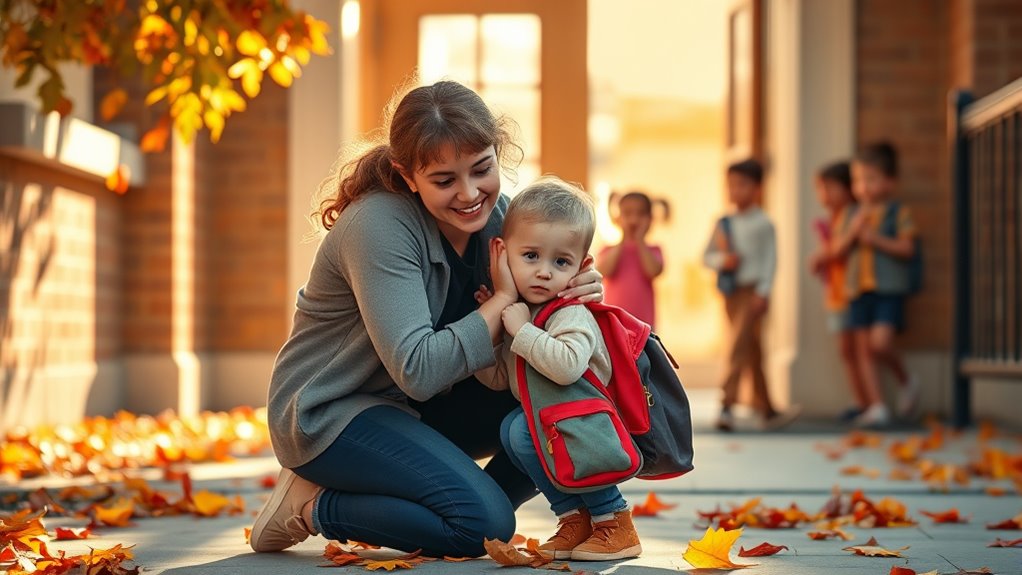
Practicing goodbyes and offering reassurance can help ease your child’s first-day jitters by establishing a sense of security. Creating consistent goodbye rituals, like a special hug or a cheerful wave, helps your child know what to expect and feel more comfortable. Using reassurance techniques such as soothing words or a quick reassurance hug can calm nerves and reinforce that you’ll return. Keep goodbyes brief but warm, avoiding drawn-out farewells that might increase anxiety. Let your child know you’re proud of them and that they’ll have a great day. Consistent routines and positive farewells build trust and familiarity, making the transition into school smoother and less intimidating. Your calm, confident goodbye reassures your child that they are safe and loved. Additionally, understanding child development stages can help you tailor your approach to best support your child’s emotional needs.
Encourage Positive Self-Talk and Confidence

Encouraging positive self-talk can boost your child’s confidence and help them face their first day with a brave attitude. Teach them to use positive affirmations like “I am prepared,” “I can do this,” or “I am brave.” When your child repeats these affirmations, it reinforces their self confidence building. Remind them that everyone feels nervous sometimes, but their words can change their mindset. Help them recognize their strengths and celebrate small successes, which further boosts their self-esteem. Incorporating impactful quotes into their daily routine can serve as powerful reminders of resilience and encouragement. By fostering a habit of positive self-talk, you’re equipping your child with a powerful tool to manage anxiety and build resilience. This simple practice can transform their outlook, making the first day less intimidating and more empowering.
Stay Calm and Supportive During Drop-Off
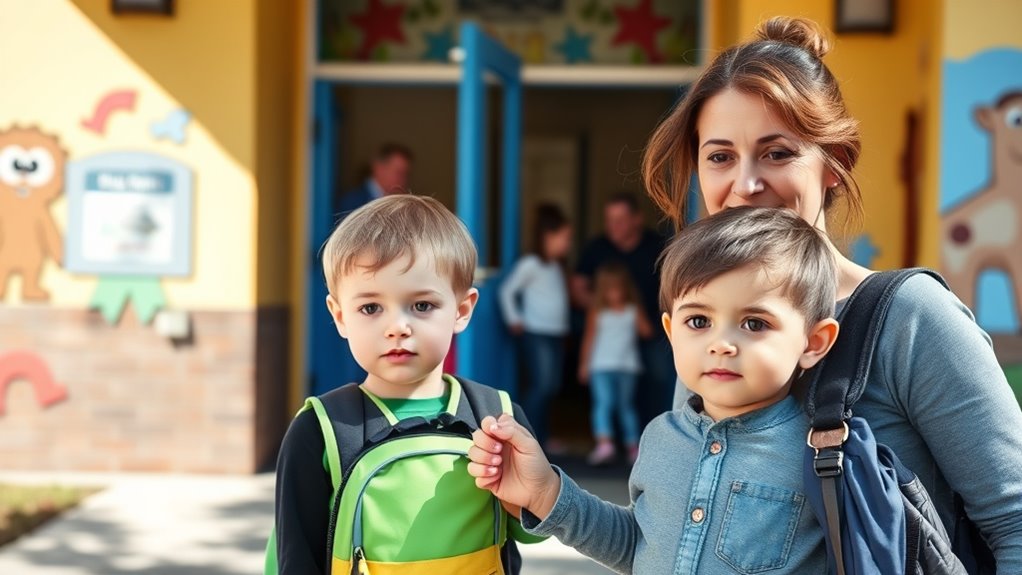
When your child feels confident through positive self-talk, your calm and supportive presence during drop-off can make all the difference. Staying composed allows you to model emotional regulation, showing your child how to manage feelings of anxiety. Offer parental reassurance with a gentle smile and comforting words, emphasizing that you’ll be back soon. Keep your goodbyes brief but warm, avoiding prolonged farewells that might increase separation anxiety. Focus on maintaining a relaxed demeanor, so your child feels safe and secure. Your steady attitude helps them trust that new experiences are manageable. Remember, your calmness encourages your child to stay calm, fostering emotional regulation that will help them navigate their first day with confidence.
Follow Up and Discuss Their First Day Experience
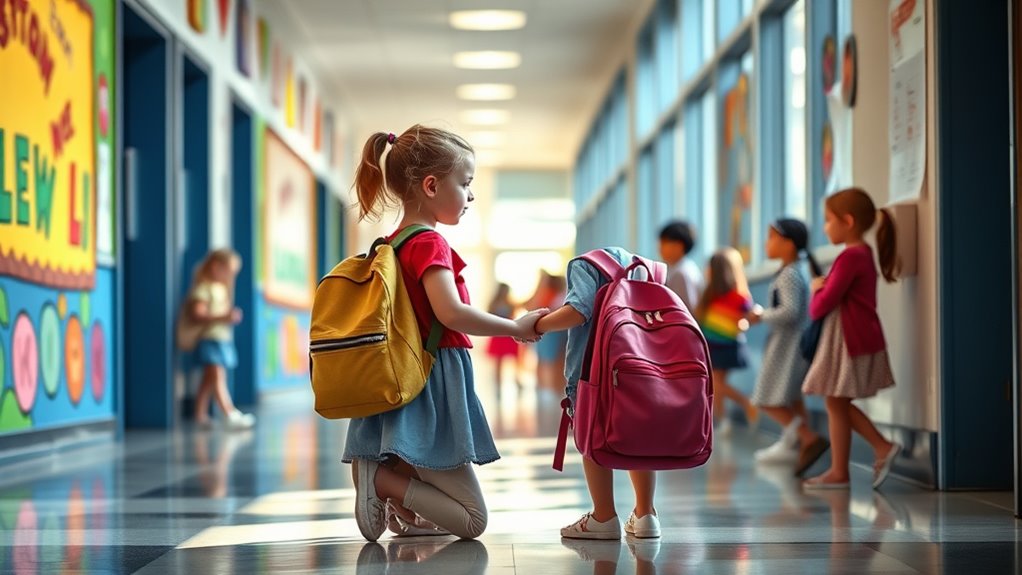
After your child’s first day, take time to ask about their impressions and listen carefully. Celebrate their positive moments and gently discuss any concerns they may have. This follow-up helps them feel heard and reassured as they adjust to their new routine.
Share Their First Impressions
Have your child share their first impressions of the day to gain insight into how they experienced their initial school moments. Ask about their feelings, what they enjoyed, and if anything surprised them. Pay attention to mentions of sibling rivalry or peer friendships, as these can reveal how they’re adjusting socially. If they mention playing with new friends, praise their efforts to connect, which boosts confidence. If sibling rivalry came up, discuss ways to handle conflicts calmly and positively. Listening carefully helps you understand their social landscape and any challenges they face. Keep your tone curious and supportive, encouraging honesty. This conversation not only shows you care but also helps your child process their feelings, making future transitions smoother.
Highlight Positive Moments
Celebrating your child’s positive moments from their first day helps reinforce their confidence and excitement about school. It’s a great way to highlight milestones and share successes. To do this effectively:
- Ask about their favorite part of the day and listen actively.
- Praise specific achievements, like making a new friend or trying something new.
- Share your own stories of first days to normalize feelings.
- Celebrate small wins, such as remembering classmates’ names or completing a task.
Address Concerns Feelings
Once you’ve highlighted your child’s positive moments, it’s important to check in on how they’re feeling about their first day. Ask gentle questions about their experiences, especially if they mention separation anxiety or nervousness about being apart from you. Encourage them to share their feelings about peer interactions—did they make a new friend or feel shy? Validate their emotions, whether they’re excited or unsure, and reassure them that it’s normal to feel this way. If they express concerns, help them find ways to cope, like taking deep breaths or talking to a trusted teacher. Listening carefully shows you support their emotional well-being and helps them process their first-day feelings confidently.
Frequently Asked Questions
How Can I Help My Child Make New Friends on the First Day?
To help your child make new friends on the first day, focus on boosting their social skills and offering playdate tips. Encourage them to smile, introduce themselves, and ask questions. Practice simple conversations beforehand to build confidence. Suggest arranging playdates with classmates beforehand, so your child feels more comfortable and familiar with peers. Your support and encouragement will help them feel more confident and enthusiastic to connect with new friends.
What Signs Indicate My Child Is Truly Struggling Emotionally?
You’ll notice your child’s emotional signs and behavioral indicators when they’re truly struggling. They might withdraw, seem unusually irritable, or show a sudden decline in schoolwork. Watch for signs like frequent tears, clinginess, or difficulty sleeping. If your child avoids friends or activities they once enjoyed, it could signal emotional distress. Paying close attention helps you step in early and provide support before issues deepen.
How Do I Handle My Own Anxiety About My Child’s First Day?
Your anxiety about your child’s first day can feel like a mountain, but remember, parent self-care is your secret weapon. Take deep breaths, remind yourself you’re doing your best, and practice anxiety management techniques like mindfulness or a quick walk. Trust that your calmness helps your child feel secure. Prioritize your well-being, because when you stay grounded, you’re better equipped to support your kid’s exciting new beginning.
What Should I Do if My Child Refuses to Go to School?
If your child refuses to go to school, you should stay calm and listen to their feelings. Address separation anxiety by reassuring them and maintaining consistent bedtime routines to create a sense of security. Gently encourage them to express their fears, and work together to find solutions. Offer comfort and support, showing that you’re there for them, which helps build confidence and eases their reluctance to attend school.
How Can I Support My Child if They Have Special Needs or Learning Differences?
When supporting your child with special needs or learning differences, remember that every cloud has a silver lining. You can become their strongest advocate by engaging in special needs advocacy and tailoring learning strategies to their strengths. Stay patient and flexible, and celebrate small victories. Your active involvement helps them feel understood and empowered, turning challenges into opportunities for growth and confidence.
Conclusion
Remember, you’re the steady anchor in their storm of first-day feelings. By validating emotions, creating routines, and offering reassurance, you help them sail smoothly into new beginnings. Each step you take is like a gentle breeze guiding them forward, turning jitters into confidence. With your calm support as their lighthouse, they’ll find their way, ready to embrace the adventure ahead. Together, you’re planting seeds of courage that will bloom long after the first day is done.
